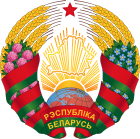| National Assembly of the Republic of Belarus Нацыянальны сход Рэспублікі Беларусь Национальное собрание Республики Беларусь | |
|---|---|
| National Assembly of the Republic of Belarus | |
 | |
| Type | |
| Type | Bicameral |
| Houses | Council of the Republic House of Representatives |
| History | |
| Founded | 11 November 1996 |
| Preceded by | Supreme Council of Belarus |
| Structure | |
| Seats | 174 members 110 representatives 64 councilors |
 | |
| Council of the Republic political groups | Government (63)
Support (1)
|
 | |
| House of Representatives political groups | Government (91)
Support (19)
|
| Elections | |
| Council of the Republic voting system | Indirect election by regional assemblies, Appointment by the President of the Republic |
| House of Representatives voting system | First-past-the-post |
| Last House of Representatives election | 25 February 2024 |
| Meeting place | |
 | |
| Website | |
| house sovrep | |
| Politics of Belarus |
|---|
 |
|
|
| Constitution |
|
PresidencyPresident Alexander Lukashenko |
|
ExecutivePrime Minister Roman Golovchenko |
| National AssemblyNational Assembly |
| All-Belarusian People's AssemblyAll-Belarusian People's Assembly |
| Judiciary |
| Administrative divisions |
|
ElectionsPresidential elections
Parliamentary elections |
|
Foreign relationsMinistry of Foreign Affairs Minister: Sergei Aleinik |
|
|
53°53′46″N 27°32′41.2″E / 53.89611°N 27.544778°E / 53.89611; 27.544778
The National Assembly of the Republic of Belarus (Belarusian: Нацыянальны сход Рэспублікі Беларусь, romanized: Nacyjanalny schod Respubliki Bielaruś; Russian: Национальное собрание Республики Беларусь, romanized: Natsionalnoye sobran'ye Respubliki Belarus') is the bicameral parliament of Belarus. The two chambers of the National Assembly are:
- the Council of the Republic – the upper house
- the House of Representatives – the lower house.
While each chamber has specific duties, both chambers have the ability to veto the decrees of local administrations that deviate from the Constitution of Belarus. The chambers of the National Assembly are convened to two regular sessions every year: the first session opens 2 October and its duration cannot be more than 80 days; the second session opens 2 April and does not last more than 90 days.
The House of Representatives and the Council of the Republic may be convened to an extraordinary session. Extraordinary sessions are convened under a particular agenda upon an initiative of the President or upon a request of at least two-thirds majority of the full membership of each of the chambers.
Any bill must be initially considered in the House of Representatives and then in the Council of the Republic. In practice, the National Assembly has no real power. The Belarusian political system concentrates all governing power in the hands of President Alexander Lukashenko. Notably, the National Assembly has no control over government spending; according to the Constitution, any bill that increases or decreases spending can only be considered with presidential permission. Presidential decrees have greater weight than ordinary legislation. However, since it took its current form in 1996, the National Assembly has been dominated by Lukashenko's supporters in any event, and there is no substantive opposition to presidential decisions.
Its predecessor was the Supreme Council of Belarus (until 1996).
Sources
- "Парламент – Национальное собрание Республики Беларусь". www.pravo.by. Retrieved 2020-05-27.
- Wilson, Andrew (6 December 2011). Belarus: The Last European Dictatorship. Yale University Press. ISBN 978-0300134353.
- "Why Does Europe Engage With Belarus's Rubber Stamp Parliament?". Archived from the original on 2017-07-26. Retrieved 2016-08-25.
| Belarus articles | |||||
|---|---|---|---|---|---|
| History | |||||
| Geography | |||||
| Politics | |||||
| Economy | |||||
| Society |
| ||||
| Presidential elections | |
|---|---|
| Parliamentary elections | |
| Municipal elections | |
| Referendums | |
| See also: Elections and referendums in the Soviet Union | |
| National legislatures in Europe | |
|---|---|
| Sovereign states |
|
| States with limited recognition | |
| Dependencies and other entities | |
| Other entities | |